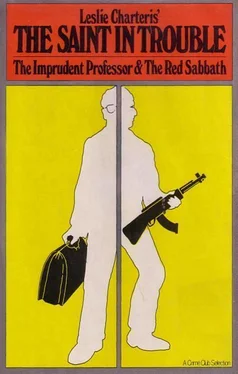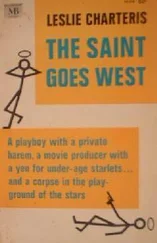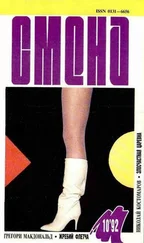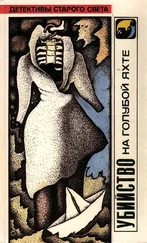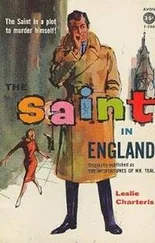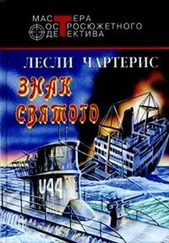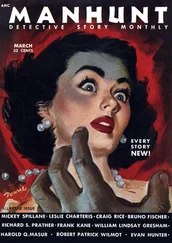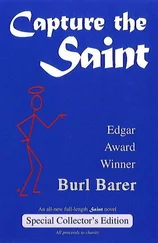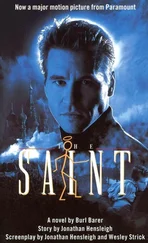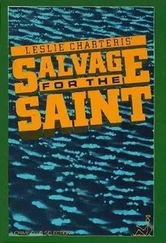He took her by the arm and led her out of the room and down the stairs. The bodyguard was sitting with his back against a wall, gingerly feeling his jaw and shaking his head muzzily. He glared up at them vengefully, but was still in no condition to make any move to stop them as the Saint found the door to the shop, took Leila through it, unlocked the front door, and led them out into the street.
Leila sat in prickly silence as he headed the car back towards the West End. He could feel the anger building up inside her, and tried to dampen the fuse.
“Think it through a bit further before you blow your top, darling,” he said quietly. “The passport isn’t there, and short of tying up Goliath and sticking pins under Sammy’s fingernails we couldn’t have found out how it’s to be delivered. But if we could have made Sammy tell us, the delivery would have been off. As it is, we know he’ll be meeting Hakim tomorrow, and Hakim is the guy we really want. We’ll just have to make sure that we’re there when they get together.”
“You are the guide,” she retorted coldly. “I am forced to count on you to make certain that we are there.”
The suspicion remained in her voice, and confirmed him in a mildly malicious decision not to dispel it by going into details.
“Don’t worry,” he said cheerfully. “I shall.”
They completed the drive without speaking again. The Saint was thinking about other things. He was quite satisfied with what they had achieved that night, and was perfectly content to let the morrow wait for itself. Hakim, Masrouf, and even Leila were far from uppermost in his thoughts when he turned the Hirondel into the mews.
The cul-de-sac was lit only by a solitary lamp at the far end, and he was into it before he saw the station wagon outside his house, facing towards him. Even so, its identity took a second to register, and by then it was too late.
He stamped on the brake as something shattered the glass of his sitting room window. The station wagon leapt forward and came swerving past them just as a terrific explosion blew out the rest of the front ground-floor windows.
As the station wagon careered past them he had barely a glimpse of two swarthy faces in it — Khaldun, probably, in the driver’s seat, his head stretched forward over the wheel, while the man beside him, looking back over his shoulder at the destruction he had caused, could have been Masrouf.
Leila Zabin moved with startling speed, reacting to the situation with reflexes sharpened by intensive training. While the Hirondel was still rocking to a standstill, her hand dived into her purse and a small automatic was in her grasp by the time it righted itself. Before the Saint could stop her, she was out of the car and taking two-handed aim. She fired as soon as her outstretched arms reached the level of her shoulders, but could only crack off two hasty rounds as the station wagon turned the corner.
The Saint threw himself out of the car and grabbed her around the waist as she began to sprint for the opening.
“Don’t be a fool,” he snapped. “You’ll never catch them now.”
She shook him off but made no move to continue her pursuit. Slowly she lowered the gun.
“For God’s sake put that thing away,” he said.
One or two windows overlooking the mews were opening, and Leila saw the sense of his advice. She pushed the automatic into the waistband of her skirt, where her coat would cover it. Nevertheless, whether from timidity or the apathy of the big city, there was as yet no rash of inquisitive neighbours to gawp at whatever the big bang might have produced to gawp at.
Simon realised that as loud as the detonation had seemed to him, because he had been so close and seen its immediate effect, anyone a little farther away might have dismissed it, perhaps wishfully, as merely an especially loud backfire or a major collision of vehicles. But in retrospect he was now fairly sure that he could tell what it had been: an ordinary hand grenade.
By that time he was opening the door of the house, with Leila close behind him.
The bomb had gone off near the middle of the room, fortunately in an area where surrounding armchairs and a couch had absorbed the brunt of its havoc. This had not entirely saved the walls and ceiling from being pockmarked by fragments of flying metal, the shattering of some ornaments and picture frames, and the gouging in the carpet of a shallow, smouldering crater which no shampooing and weaving service was ever going to restore. All the same, the blast had not been severe enough to cause any radical structural damage.
The Saint stood completely still as he surveyed the debris through the dust and smoke that lingered in the air. There was a strange, unnatural calm about him that was somehow more frightening than a torrent of threats against those responsible could ever have been. As far as he was concerned, there could be no more standing on the sidelines. The conflict of tribes and ideologies about which he had previously felt only a biased neutrality was suddenly of secondary importance. Now his own home had been violated. Furniture could be quickly replaced, and surfaces patched up, but the savage invasion of his most private territory had created a personal debt that could only be personally repaid.
There was also another person to think of — such a recent and secondary addition to his concerns that the Saint had momentarily forgotten him.
“Yakovitz!” Leila’s tensely anxious voice was his reminder.
“Yakovitz?” Simon echoed her mechanically.
There was certainly no trace of her subordinate in the shattered living room, which could have been a hopeful sign. And then a low moan, hardly above a whimper, came from the kitchen.
Yakovitz was lying face down on the kitchen floor in a litter of broken crockery and overturned utensils. As the Saint knelt down and felt for his pulse, he stirred and opened his eyes. He shook his head slowly and pulled himself up until he was half sitting, half kneeling.
“Take it easy,” said the Saint. “Keep still.”
His fingers gently probed the other’s body, but Yakovitz didn’t flinch. Satisfied that there was no serious injury, he soaked a towel and tried to wipe away the dust and stains from the man’s face, but Yakovitz took it away and did it himself.
“I am all right,” he growled. “I was only knocked-out.”
Apparently he had been brewing himself some coffee when the grenade smashed through the window, and enough of the blast had come through the open doorway to throw him across the kitchen, and he had hit his head as he fell. Aside from one or two scratches, he had suffered nothing worse than a mild concussion.
Simon helped him back to the living room and into one of the still serviceable armchairs.
“He’s a lucky lad, is your Yakovitz,” he told Leila. “A few minutes earlier or later, and we’d probably have been scraping bits of him off the walls.”
“Lucky,” Yakovitz said stoically, “I have a thick head.”
Most of the bottles and glasses on the hospitality table were in smithereens, but the Saint found a bottle of cognac and a glass that had miraculously survived, and poured Yakovitz a hefty tot.
“While that’s making your head thinner,” he said, “I’d better do something about making our drama less public.”
Outside the front windows there were brightly painted shutters hinged to the wall, ostensibly to give the house a pleasantly rustic air, but they were also functional. Simon had just closed and secured them when a blue-uniformed figure loomed up at his shoulder.
“Would this be where that explosion was?” enquired the Law.
“Oh, did you hear it, or did somebody phone in?” countered the Saint ingenuously, giving himself a moment in which to think.
Читать дальше
